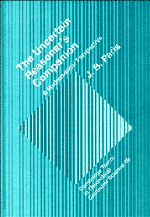Book contents
- Frontmatter
- Contents
- Introduction
- 1 Motivation
- 2 Belief as Probability
- 3 Justifying Belief as Probability
- 4 Dempster–Shafer Belief
- 5 Truth-functional Belief
- 6 Inference Processes
- 7 Principles of Uncertain Reasoning
- 8 Belief Revision
- 9 Independence
- 10 Computational Feasibility
- 11 Uncertain Reasoning in the Predicate Calculus
- 12 Principles of Predicate Uncertain Reasoning
- Glossary
- Bibliography
- Index
7 - Principles of Uncertain Reasoning
Published online by Cambridge University Press: 29 October 2009
- Frontmatter
- Contents
- Introduction
- 1 Motivation
- 2 Belief as Probability
- 3 Justifying Belief as Probability
- 4 Dempster–Shafer Belief
- 5 Truth-functional Belief
- 6 Inference Processes
- 7 Principles of Uncertain Reasoning
- 8 Belief Revision
- 9 Independence
- 10 Computational Feasibility
- 11 Uncertain Reasoning in the Predicate Calculus
- 12 Principles of Predicate Uncertain Reasoning
- Glossary
- Bibliography
- Index
Summary
In the previous chapter we introduced a selection of the more popular inference processes which have been proposed. This raises the question of why to prefer one such process over any other. In this chapter we shall consider this question by presenting a number of properties, or as we shall call them, principles, which it might be deemed desirable that an inference process, N, should satisfy.
For the most part these principles could be said to be based on common sense or rationality or ‘consistency’ in the natural language sense of the word. A justification for assuming that adherence to common sense is a desirable property of an inference process comes from the Watts Assumption given in Chapter 5. For if K genuinely does represent all the expert's knowledge then any conclusion the expert draws from K should be the result of applying what, by consensus, we consider correct reasoning, i.e. of common sense.
So our plan now is to present a list of such principles. We shall limit ourselves to the case where Bel is a probability function, although the same criteria could be applied to inference processes for DS-belief functions, possibility functions etc. In what follows N stands for an inference process for L. Here L is to be thought of as variable. If we wish to consider a principle for a particular language L we shall insert ‘for L’.
Equivalence Principle
If K1, K2 ∈ CL are equivalent in the sense that VL(K1) = VL(K2) then N(K1) = N(K2).
- Type
- Chapter
- Information
- The Uncertain Reasoner's CompanionA Mathematical Perspective, pp. 82 - 111Publisher: Cambridge University PressPrint publication year: 1995

